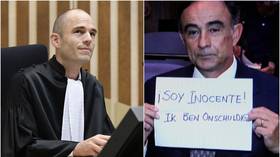Dutch prosecutor on MH17 team testifies how he plotted arrest & extradition of innocent man to Argentina in 2009

Dutch public prosecutor Ward Ferdinandusse has recently told a court how he concocted a plan to extradite a man to Argentina, where he spent eight years in prison before being acquitted. Ferdinandusse now co-leads the MH17 probe.
Ferdinandusse told a Rotterdam court that the Dutch had “initiated” an investigation into Julio Poch, a Dutch-Argentinian pilot with the country’s Transavia airline, in 2008.
The accusations against Poch stem from the remarks he supposedly made at a dinner in Bali, Indonesia, in 2003. Several co-workers claimed the former Argentinian naval aviator defended the so-called ‘death flights’ – the extrajudicial killings carried out by the Argentinian military junta in the 1970s and 1980s, during which dissidents were drugged and thrown out of planes into Rio de la Plata river and the Atlantic Ocean. “We threw them into the sea,” a drunk Poch was described as saying.
Three years later, one of Poch’s colleagues reported him to the Dutch police and the prosecutor’s office. According to Dutch news outlet RTL Nieuws, that person was not present at the dinner at which Poch had allegedly made the remarks about ‘death flights’.
Also on rt.com Argentine ‘death flight’ pilots get life for 100s of junta opponents thrown into oceanFerdinandusse said the Argentinians were keen on investigating Poch as well, because Buenos Aires was actively seeking out people responsible for human rights abuses during the junta days.
The prosecutor, who, at the time, had just recently earned criminal-law credentials, went on a trip to Argentina in May 2008, where the Dutch were given a tour of former torture cells used by the junta. An investigative judge from Argentina visited the Netherlands the same year.
The investigators had only one problem: the existing 19th-century bilateral extradition treaty did not allow the Dutch to extradite its own citizens. So Fernandusse devised a plan to apprehend Poch elsewhere.
“I informed the Argentinians that we could cooperate in the arrest of Poch in another country. I pointed out that the Argentinians could ask for Poch’s movements, as per a request for legal assistance,” he said.
Also on rt.com Dutch lawsuit with ECHR alleging Russia played part in MH17 downing will only further ‘complicate’ search for truth – MoscowFerdinandusse added that there were disagreements about whether the Dutch should share its own citizens’ travel data with Buenos Aires, so he had to write a note to ultimately convince superiors to greenlight cooperation with the Argentinians.
In 2009, Poch was arrested at Valencia Airport, Spain as he was traveling with his family and was about to make his final flight for Transavia.
Dutch Justice Minister Ferd Grapperhaus confirmed last year that the idea to tip off the Argentinians that Poch would be flying to Spain came from an unnamed public prosecution department worker.
The pilot maintained his innocence and insisted his words on ‘death flights’ had been misinterpreted. Nevertheless, Poch was sent to Argentina, where he spent eight years behind bars awaiting trial. He was finally acquitted by an Argentinian court in 2017 for lack of evidence. He has since returned to the Netherlands and is suing the Dutch government for damages.
Also on rt.com Plane bias: Russia’s decision to quit MH17 panel a logical result of Dutch provocationsFerdinandusse later became one of the three public prosecutors in the case surrounding the Malaysia Airlines MH17 flight, which was shot down in Eastern Ukraine in 2014 amid a civil war there. All 298 people on board died.
The Dutch prosecutors subsequently accused four rebel commanders, who were fighting against the central government in Kiev, of downing the aircraft with a Buk air defense missile system that they had allegedly obtained from Russia. The suspects denied any involvement in the plane crash and refused to travel to the Netherlands for questioning.
Last year, Russia said it was “impossible” to continue MH17 consultations with the Netherlands and Australia, as they sought only to blame Moscow, ignoring contrary evidence. Moscow insisted that the probe ignored a large batch of data on the crash that Russia was eager to provide, instead relying largely on the evidence from Ukraine, and on ‘open-source’ information such as clips of purported evidence posted on social media.
Think your friends would be interested? Share this story!












